Questões de Vestibular FUVEST 2019 para Vestibular - Primeira Fase
Foram encontradas 90 questões
Um vídeo do astrônomo Carl Sagan em seu programa dos anos 1980, Cosmos, conta a história de Eratóstenes, demonstrando como os gregos antigos já haviam descoberto que a Terra é uma esfera (geoide). Para fazer isso, Eratóstenes observou a sombra de duas colunas no solstício de verão; uma coluna foi colocada em Alexandria e outra em Siena (atualmente Assuan), ambas no Egito. Ele notou que em Siena, ao meio dia, o Sol ficava em seu ponto mais alto e a coluna lá instalada projetava uma sombra com ângulo diferente daquela projetada em Alexandria. Sagan explica então que, se a Terra fosse plana, ambas as estruturas produziriam sombras iguais, mas como o planeta é esférico, o sombreamento varia.
Disponível em https://revistagalileu.globo.com/. Adaptado. 2019

Disponível em https://www.youtube.com/. Adaptado.
A esfericidade do Planeta Terra demonstrada por Eratóstenes
e relembrada por Carl Sagan explica, em conjunto com outros
fatores,
Em reportagem publicada em 2018, a revista FAPESP apresenta uma pesquisa da Superintendência de Controle de Endemias (SUCEN) que usou informações de data e local de mortes de macacos por um determinado vírus. A partir do estudo, construiu‐se um modelo epidemiológico que descreve o sentido de deslocamento e os corredores ecológicos funcionais (corredores prováveis) do vírus.
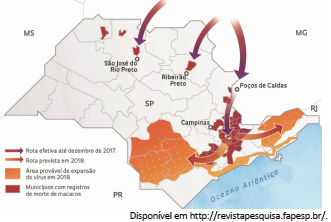
Com base nas informações e no mapa, o corredor ecológico
funcional desse vírus, que atingiu a maior abrangência territorial
no Estado de São Paulo durante o ano de 2017, avançou
principalmente por quaisregiões e causou qual enfermidade?
O processo de desertificação é definido como a degradação ambiental e socioambiental, particularmente nas zonas áridas, semiáridas e subúmidas, resultantes de vários fatores e vetores, incluindo as variações e alterações climáticas e as atividades humanas.
BRASIL, Ministério do Meio Ambiente. Disponível em http://www.mma.gov.br/.
Dentre as medidas mais adequadas para mitigação dos efeitos da desertificação encontra(m)‐se
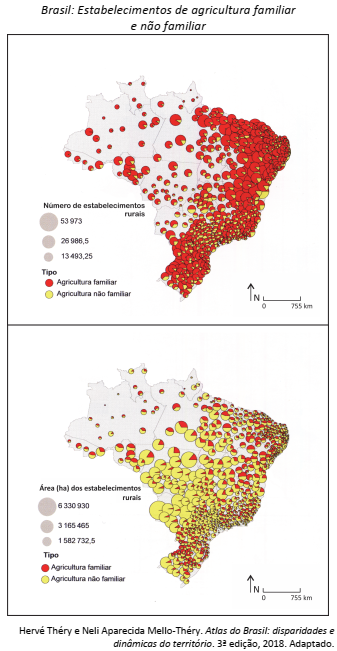
Sobre a produção agrícola brasileira e os dados apresentados
nos cartogramas, é correto afirmar:
É de grande relevância aqui o fato de que uma grande proporção do trânsito de internet do mundo passa pelos Estados Unidos (...). Isso significa que a NSA (a agência de segurança nacional dos EUA) poderia acessar uma quantidade alarmante de ligações telefônicas simplesmente escolhendo as instalações certas. O que é ainda mais inacreditável: essas instalações não passam de alguns prédios, conhecidos como “hotéis de telecomunicação”, que hospedam os principais centros de conexão de internet e telefonia do planeta todo.
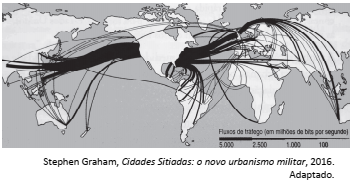
A respeito da configuração espacial e geopolítica retratada no
excerto e no mapa, é possível afirmar que
O Ciclone Tropical Idai atingiu o litoral de Moçambique na noite de quinta‐feira (21/03/2019), provocando grandes danos na cidade de Beira. Cerca de 500 mil pessoas ficaram sem energia, afetando também o setor de comunicações.
Disponível em https://www.climatempo.com.br/. Adaptado.
Essa notícia refere‐se ao Ciclone Tropical que atingiu principalmente Moçambique, Zimbábue e Malaui. Eventos dessa magnitude e superiores – o Ciclone Idai atingiu apenas a categoria 2 em uma escala de 1 a 5 – ocorrem em outros locais do planeta e não repercutem da mesma forma, com a perda de centenas de vidas. Isso ocorre em função
Em Barcelona, em 2012 e 2013, a cada 15 minutos uma família recebia ordem de despejo. Desde então, o panorama da habitação mudou totalmente. “(...) Estamos assistindo uma onda de especulação imobiliária (...) que agora se foca no aluguel”, explica Daniel Pardo da Associação de Moradores para um Turismo Sustentável. “Este fenômeno pôs em marcha um processo acelerado e violento de expulsão de inquilinos”, acrescenta. Onde a pressão da especulação imobiliária internacional e a indústria do turismo causaram um aumento substancial nos preços dos aluguéis, os catalães têm hoje de gastar mais de 46% dos seus salários com o aluguel. Para os jovens até os 35 anos, a taxa de esforço aumenta até os 65% (...). “Não queremos que os habitantes de Barcelona sejam substituídos por pessoas com maior poder de compra”, diz a porta‐voz do Sindicato dosInquilinos. Só emBarcelona, 15 fundos de investimento imobiliário possuem 3.000 apartamentos.
“Os habitantes querem a sua cidade de volta”. Reportagem de Ulrike Prinz para o Goethe‐Institut Madrid. Maio/2018. Adaptado.
Os conceitos que explicam as dinâmicas urbanas descritas no excerto são:
No Brasil, várias cidades registram ocupação irregular de encostas em áreas sujeitas a deslizamentos de terra (também chamados de escorregamentos). O Instituto de Pesquisas Tecnológicas (IPT) trabalha no levantamento, mapeamento, recuperação e estabilização dessas áreas de risco. Um exemplo deste trabalho foram aqueles executados desde a década de 1970 referentes aos deslizamentos dos morros de Santos e São Vicente‐SP, cuja região é acometida há tempos por esses problemas, inclusive com a ocorrência de vítimas fatais. Para investigar os deslizamentos de terra nas áreas serranas tropicais brasileiras, o Instituto realizou levantamentos topográficos, geológicos e geomorfológicos, estudando também a distribuição dos tipos de vegetação existentes e as categorias de ocupação urbana dos morros.
Representação de deslizamento de terra (escorregamento)
na região de Santos e São Vicente
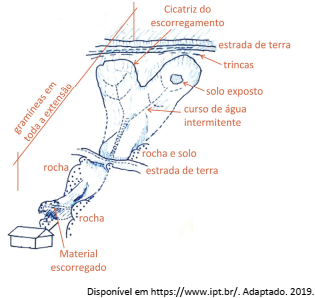
Baseando‐se nas informações do texto e na figura, é correto
afirmar que
Se muita gente hoje enxerga a Terra como um sistema dinâmico de conexões entre atmosfera, águas, rochas e biodiversidade, isso se deve, em larga medida, a Alexander von Humboldt (1769 – 1859). O vulcão Chimborazo (6.268 m de altitude), no atual Equador, foi utilizado por Humboldt como exemplo para apresentar com clareza, pela primeira vez, como cada faixa altitudinal em regiões montanhosas é um microcosmo de climas e biodiversidade.
Disponível em https://www1.folha.uol.com.br/ciencia/. Adaptado.
Representação esquemática do vulcão Chimborazo
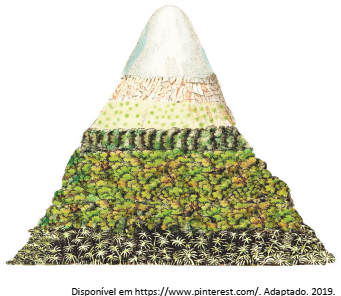
Considerando a relação entre vegetação e altitude, da base
até o topo das zonas do vulcão representado, é possível obter
a sequência: